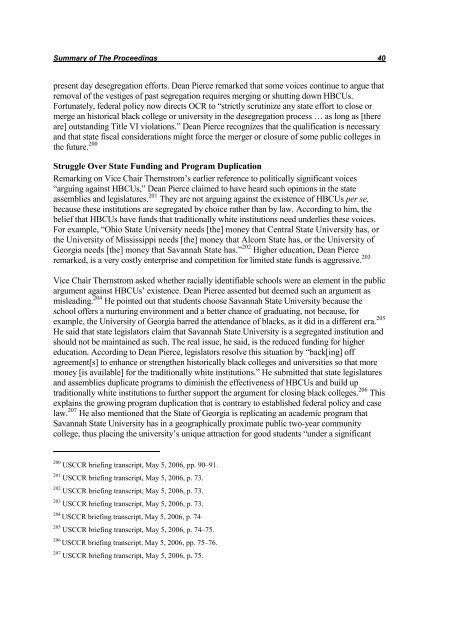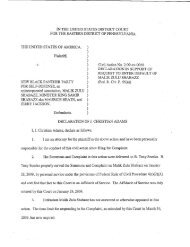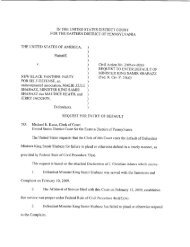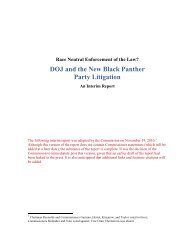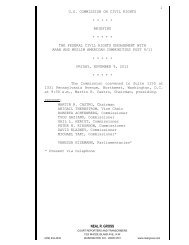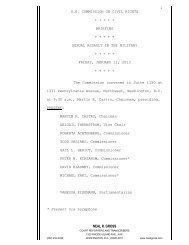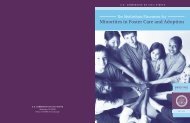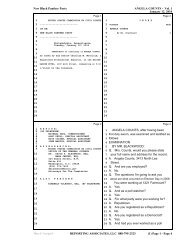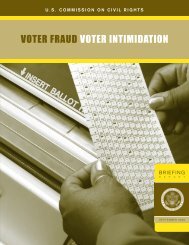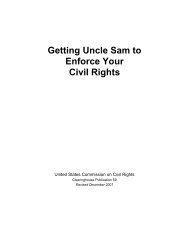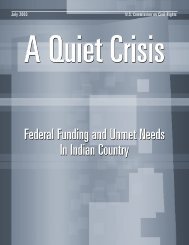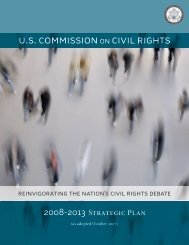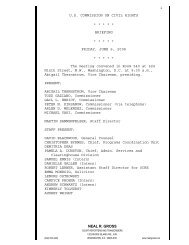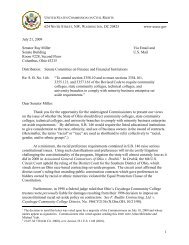The Educational Effectiveness of Historically Black Colleges and ...
The Educational Effectiveness of Historically Black Colleges and ...
The Educational Effectiveness of Historically Black Colleges and ...
Create successful ePaper yourself
Turn your PDF publications into a flip-book with our unique Google optimized e-Paper software.
Summary <strong>of</strong> <strong>The</strong> Proceedings 40<br />
present day desegregation efforts. Dean Pierce remarked that some voices continue to argue that<br />
removal <strong>of</strong> the vestiges <strong>of</strong> past segregation requires merging or shutting down HBCUs.<br />
Fortunately, federal policy now directs OCR to “strictly scrutinize any state effort to close or<br />
merge an historical black college or university in the desegregation process … as long as [there<br />
are] outst<strong>and</strong>ing Title VI violations.” Dean Pierce recognizes that the qualification is necessary<br />
<strong>and</strong> that state fiscal considerations might force the merger or closure <strong>of</strong> some public colleges in<br />
the future. 200<br />
Struggle Over State Funding <strong>and</strong> Program Duplication<br />
Remarking on Vice Chair <strong>The</strong>rnstrom’s earlier reference to politically significant voices<br />
“arguing against HBCUs,” Dean Pierce claimed to have heard such opinions in the state<br />
assemblies <strong>and</strong> legislatures. 201 <strong>The</strong>y are not arguing against the existence <strong>of</strong> HBCUs per se,<br />
because these institutions are segregated by choice rather than by law. According to him, the<br />
belief that HBCUs have funds that traditionally white institutions need underlies these voices.<br />
For example, “Ohio State University needs [the] money that Central State University has, or<br />
the University <strong>of</strong> Mississippi needs [the] money that Alcorn State has, or the University <strong>of</strong><br />
Georgia needs [the] money that Savannah State has.” 202 Higher education, Dean Pierce<br />
remarked, is a very costly enterprise <strong>and</strong> competition for limited state funds is aggressive. 203<br />
Vice Chair <strong>The</strong>rnstrom asked whether racially identifiable schools were an element in the public<br />
argument against HBCUs’ existence. Dean Pierce assented but deemed such an argument as<br />
misleading. 204 He pointed out that students choose Savannah State University because the<br />
school <strong>of</strong>fers a nurturing environment <strong>and</strong> a better chance <strong>of</strong> graduating, not because, for<br />
example, the University <strong>of</strong> Georgia barred the attendance <strong>of</strong> blacks, as it did in a different era. 205<br />
He said that state legislators claim that Savannah State University is a segregated institution <strong>and</strong><br />
should not be maintained as such. <strong>The</strong> real issue, he said, is the reduced funding for higher<br />
education. According to Dean Pierce, legislators resolve this situation by “back[ing] <strong>of</strong>f<br />
agreement[s] to enhance or strengthen historically black colleges <strong>and</strong> universities so that more<br />
money [is available] for the traditionally white institutions.” He submitted that state legislatures<br />
<strong>and</strong> assemblies duplicate programs to diminish the effectiveness <strong>of</strong> HBCUs <strong>and</strong> build up<br />
traditionally white institutions to further support the argument for closing black colleges. 206 This<br />
explains the growing program duplication that is contrary to established federal policy <strong>and</strong> case<br />
law. 207 He also mentioned that the State <strong>of</strong> Georgia is replicating an academic program that<br />
Savannah State University has in a geographically proximate public two-year community<br />
college, thus placing the university’s unique attraction for good students “under a significant<br />
200 USCCR briefing transcript, May 5, 2006, pp. 90–91.<br />
201 USCCR briefing transcript, May 5, 2006, p. 73.<br />
202 USCCR briefing transcript, May 5, 2006, p. 73.<br />
203 USCCR briefing transcript, May 5, 2006, p. 73.<br />
204 USCCR briefing transcript, May 5, 2006, p. 74<br />
205 USCCR briefing transcript, May 5, 2006, p. 74–75.<br />
206 USCCR briefing transcript, May 5, 2006, pp. 75–76.<br />
207 USCCR briefing transcript, May 5, 2006, p. 75.


